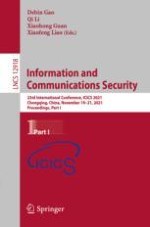2021 | OriginalPaper | Buchkapitel
Certified Malware in South Korea: A Localized Study of Breaches of Trust in Code-Signing PKI Ecosystem
verfasst von : Bumjun Kwon, Sanghyun Hong, Yuseok Jeon, Doowon Kim
Erschienen in: Information and Communications Security
Aktivieren Sie unsere intelligente Suche, um passende Fachinhalte oder Patente zu finden.
Wählen Sie Textabschnitte aus um mit Künstlicher Intelligenz passenden Patente zu finden. powered by
Markieren Sie Textabschnitte, um KI-gestützt weitere passende Inhalte zu finden. powered by
